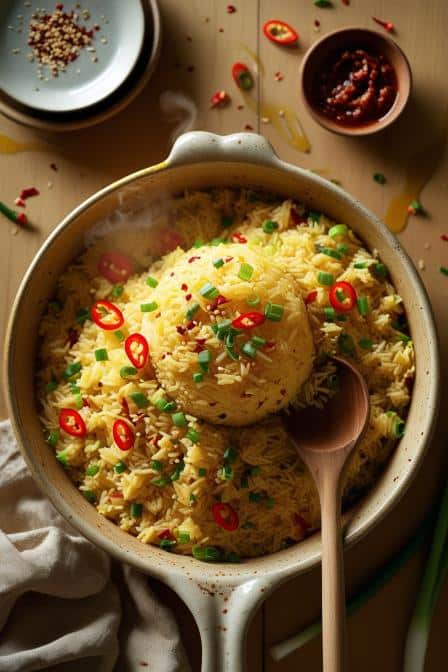Ever found y’self standing by a smoking-hot wok at midnight, craving something quick, spicy, and deeply comforting? I have. And let me tell ya—there’s magic in that moment when leftover rice hits sizzling oil, eggs scramble into silky ribbons, and fresh chilies throw their wicked perfume into the air. Spicy Egg Fried Rice isn’t just a meal. It’s a lifesaver, a mood lifter, an edible exclamation mark.
What makes this recipe special ain’t just the heat. It’s the balance. The play of chewy grains, soft eggs, punchy aromatics, and bright garnishes. Plus, it’s endlessly riffable—good for those nights when the fridge looks like a ghost town.
So buckle in. We’re about to break down how to make Spicy Egg Fried Rice that’s better than your favourite takeout, why each step matters, and how you can bend the rules to suit your taste buds or pantry.
Why Spicy Egg Fried Rice deserves your wok’s respect
Sure, fried rice is everywhere. But done right? It becomes something more. Here, the spice isn’t just for burn—it sharpens the richness of egg, lifts the oil, and carries the smoky wok aroma.
Some cooks add chili paste; others swear by fresh bird’s eye chilies for raw heat. Some toss in soy, while others love the funk of fish sauce. In any form, it’s quick, bold, and deeply satisfying. Plus, the dish carries centuries of wok cooking tradition, where fire, speed, and improvisation turn scraps into gold.
And yes—you can pull it off in a regular skillet too. Though, a wok gives you that elusive breath-of-the-wok smokiness Chinese chefs call wok hei. More on that soon.
Ingredients & Substitutions
Every spoonful of Spicy Egg Fried Rice relies on a careful mix of texture, heat, and umami. Here’s what you’ll need and how you can swap if needed.
| Ingredient | Purpose | High-quality substitutions / tips |
|---|---|---|
| Cooked jasmine rice (cold) | Chewy base, soaks up flavour | Basmati for lighter grains; short-grain rice for stickier feel. Always day-old for dryness. |
| Eggs (3–4 large) | Creamy richness, protein | Firm tofu crumbles for vegan; add pinch of black salt to mimic egg aroma. |
| Fresh red & green chilies | Sharp, fresh heat | Chili flakes or sriracha. Bird’s eye for more fire; jalapeño for milder heat. |
| Garlic (2–3 cloves) | Deep savouriness | Garlic paste in a pinch; roasted garlic for milder, sweeter note. |
| Soy sauce (2–3 tbsp) | Salt, umami | Tamari (gluten-free); coconut aminos for lighter sweetness. |
| Sesame oil (1 tsp) | Nutty aroma | Toasted peanut oil; omit if allergic. |
| Spring onions | Fresh bite, colour | Chives or leeks sliced thinly. |
| Vegetable oil (for frying) | High smoke point | Canola, sunflower, or grapeseed oil. |
| Optional: chili paste | Deeper, fermented heat | Gochujang, sambal oelek, or homemade chili oil. |
Why cold rice? Freshly cooked rice is steamy, sticky, and clumps. Cold rice dries a bit, letting each grain fry separately, turning crisp at the edges. And that crunch is what dreams are made of.
Step-by-Step Instructions
Cooking Spicy Egg Fried Rice ain’t complicated, but the details matter. Here’s how to nail it every darn time.
Step 1: Prep before heat
Dice chilies, mince garlic, beat eggs lightly with pinch of salt. Break cold rice apart with wet hands or fork—clumps ruin even the bravest wok.
Pro tip: Keep everything within arm’s reach. Stir-fry waits for no one.
Step 2: Sear aromatics
Heat wok until a drop of water skitters away. Add vegetable oil, swirl. Toss in garlic and fresh chilies. Stir just till fragrant—10–15 seconds. Don’t let garlic brown too far; burnt garlic tastes like heartbreak.
Step 3: Eggs meet heat
Push aromatics aside, pour in eggs. Let them set for a moment, then stir gently, scraping bottom so curds stay fluffy not rubbery.
Common mistake? Overcooking eggs till dry. Keep them just set—they’ll finish cooking in rice.
Step 4: Rice joins the party
Add rice. Smash clumps, then toss, fold, toss again. High heat is your friend here—evaporates excess moisture, keeps rice dry, grains distinct.
Add soy sauce around the edges so it caramelises slightly on hot metal before hitting rice.
Step 5: Finish & garnish
Drizzle sesame oil, sprinkle spring onions. Toss again, taste. Need more salt? Add splash more soy. Too mild? Throw in extra chili paste.
Variations:
- More heat? Add crushed chili flakes.
- Smoky? Drop of dark soy sauce.
- Sweet-spicy? Spoon of chili jam.
Cooking Techniques & Science
Why high heat matters
Wok hei—the “breath of the wok”—comes from cooking over ripping-hot heat, charring sauce sugars, caramelising rice edges, and adding faint smoky aroma. Even on home stoves, hotter pans make better fried rice.
Science of cold rice
Cold rice has retrograded starches—meaning grains stay separate, fry rather than steam. Warm, fresh rice clumps because steam makes grains sticky.
Eggs as binder
Egg coats rice lightly, adding richness. Scrambling before adding rice keeps curds tender; pouring eggs over rice makes wetter texture—neither wrong, just different.
Tools & impact
- Wok: Rounded sides, concentrated heat, easy tossing.
- Flat-bottomed pan: Works on electric stoves; needs more spatula work.
- Long chopsticks: Great for tossing without mashing rice.
Storage & Reheat
Cool leftover fried rice quickly (spread on tray). Store airtight in fridge up to 3 days. Reheat in hot pan with splash of water or stock, stir constantly.
Freeze? Sure—use freezer bags, press flat. Reheat straight from frozen in pan (no microwave; ruins texture).
Variations & substitutions
- Vegan? Use tofu instead of eggs, add mushroom soy sauce.
- Gluten-free? Tamari instead of regular soy.
- Low-sodium? Light soy or dilute with water.
Serving & Pairing Suggestions
Presentation magic
Spoon rice into small bowl, press gently, flip onto plate for perfect dome. Top with extra sliced chilies, fried shallots, drizzle of chili oil.
Scatter fresh coriander, sesame seeds. Looks fancy, eats better.
Pair with
- Cucumber salad—cools heat.
- Miso soup—umami balance.
- Jasmine tea—or cold beer, honestly.
- Sautéed greens—bok choy, spinach.
Contrast matters. The fire of rice loves the calm of fresh veg or gentle broth.
Best time to serve or eat
Late night snack? Perfect. Quick lunch? Even better. Weekend brunch with friends? Rice wins hearts every time.
Traditionally, fried rice was breakfast—using last night’s leftovers. But let’s be real: it’s good whenever hunger strikes.
Conclusion: what makes this spicy rice special
Spicy Egg Fried Rice is humble yet mighty. Quick to cook, thrilling to eat, forgiving to improvise.
Key tips to remember:
- Use cold rice.
- High heat, fast moves.
- Fresh aromatics for brightness.
- Taste constantly, adjust as you go.
Cooking is jazz, not a marching band. Play, taste, trust your senses.
FAQs
Why is my fried rice mushy?
Likely used warm rice or overcrowded the pan. Use day-old rice, fry in batches if pan is small.
Can I make it less spicy?
Of course. Skip fresh chilies, use mild chili sauce, or halve amount. Add sweetness (like hoisin) to balance.
Do I really need a wok?
Nope—but it helps. Use widest skillet you have, keep heat high, don’t stop stirring.
Can I add meat?
Absolutely. Shrimp, diced chicken, or Chinese sausage. Cook meat first, set aside, add back with rice.
How long does it keep?
Fridge, 3 days. Freeze up to a month. Always reheat till piping hot.
And there you have it. A dish that’s fast, fiery, and utterly flexible. So next time the clock says midnight and your belly says “something spicy,” you know what to do.
Get that wok hot, break out the rice, and let the chilies sing.

